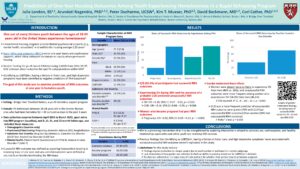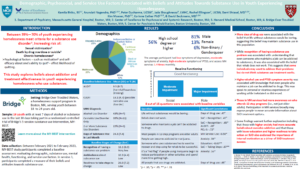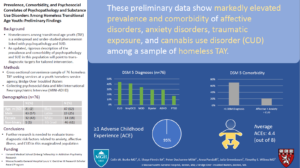Research
Whalen Center for Youth Research and Project Development
Quality Improvement Projects
We are excited to announce that we are piloting several new services to support young adults who come to Bridge seeking assistance.
Title: Contingency Management as a Powerful Harm Reduction Tool for Youth Experiencing Homelessness
We are piloting a contingency management program designed to reduce or stop the use of substances in young adults (ages 18-24) who are interested in changing their relationship to substances. Contingency Management provides financial incentives to assist people in reaching their personal goals and is a well-validated treatment approach to behavior change. Studies have found this approach to be efficacious in helping people increase sobriety, quit addictive substances, and increase engagement in behavioral health services. This is a promising approach to adapt and pilot at Bridge. Our goal is to not only reduce substance use during a young adult’s participation in this project, but to also support and motivate young adults as they attend support groups, recovery centers, and sober gyms.
Title: Going Home Program: A Family and Financial-Based Intervention Diverting Young Adults from Homelessness and Housing Instability
The purpose of the Going Home Program is to better identify and support young adults who are interested in problem-solving with family and/or guardians to prevent dependence on emergency shelters. There are two components to this project: family conflict resolution and financial support in a crucial moment of family conflict. Family conflict is a key reason for young adult homelessness. While some of that conflict is unsafe to return to, there is a subset of young adults for whom this dual approach may be the right diversion away from a shelter system at the right time. This diversion is meant to allow youth a chance to work on self-sufficiency through Bridge’s educational and career services without having to enter the instability of the emergency shelter system.

Title: Reducing Substance Use in a Fun Environment for Young Adults Experiencing Homelessness: The Bridge Wellness Retreat
The Bridge Wellness Retreat will provide a short break away from the day-to-day routine for young adults experiencing homelessness and the stress of unstable housing. The purpose of this retreat is also to provide a break from substances and an opportunity to experience new ways to cope with the significant stressors going on in their lives. Participants will stay in a newly built residential house and take part in therapeutic groups such as Sensory Coping Group, Conflict Resolution Group, CBT for Stress Management, Substance Use Reduction Group, and all pathways Recovery Meetings for young people. In addition, young adults will also get the opportunity to take part in fun outings and experiences. We are interested in finding out what young adults think of the experience and how it impacts their substance use.

Title: The Effects of a Financial Advising Initiative for Transitional Aged Youth Experiencing Homelessness
Nicknamed the “Millionaire Club,” this initiative at Bridge aims to provide financial savings and investment education to young adults who are interested in understanding more about this topic. Any young adult at Bridge may sign up. However, it is a requirement of those young adults who are living in Brunson House or Liberty House. These two residential programs are independent living programs with support. One of the purposes of these programs is to help Bridge young adults build up their independent living skills and financial independence in terms of savings, credit history, etc. It is a perfect opportunity to also learn more about finances and we hypothesize that long-term outcomes will be better for those who are more financially prepared. This financial advising includes multiple sessions covering high-yield savings accounts, investments, and more! We are interested in understanding how the young adults’ financial goals, sense of financial security, and hope for the future evolve over the course of these sessions.
Title: Long-Term Rapid Rehousing Follow-Up for Young Adults
Youth and young adult Rapid Re-housing program is a program where youth live independently in their own apartment, signing a lease in their name, and receiving rental assistance and case management for up to two years. We are interested in learning more about what happens at the end of their time with Rapid Rehousing, what they have learned, and what feedback they have about the program. Outcome measurements include obtaining safe and stable housing, achieving academic goals, achieving job readiness, and obtaining financial and personal self-sufficiency.
Research Collaboration
Building on a history of research participation, Bridge has partnered with MGH’s Psychiatry Department and their Center of Excellence to form a robust collaboration that unites researchers with the often-understudied demographic of homeless youth. This partnership allows Bridge to leverage the expertise and resources of a world-renowned research organization to assess the efficacy of our model and methods. In an increasingly data-driven world, providing proof of impact and testing our services through research solidifies our status as a leader in the field of youth homelessness, and provides us with concrete results we can share and disseminate.
Title: Toward Enhancing Resilience: The Role of Stress in Cannabis Use Disorder Among Homeless Transitional-Age Youth.
Principal Investigator: Colin Burke, MD
Collaborator: Youth Experiencing Homelessness Program at Massachusetts General Hospital, Department of Psychiatry
Bridge has partnered with Dr. Colin Burke, the Director of the Youth Experiencing Homelessness Program at Massachusetts General Hospital, to understand more about the role of cannabis and stress in the lives of young adults who are experiencing homelessness. Affectionately nicknamed, the “Stress Study” by Bridge team members and young adults, this study invites young people (ages 16-25) to answer questions about themselves and listen to a series of auditory stressors (i.e., occasional loud beeps) while their heart rate and cortisol levels in the form of palm sweat and eye blinks are recorded. The youth receive a $50 Target gift card for their participation and (as with all voluntary research) are reminded that they can stop or skip portions at any time. So far, this has been a very interesting and overall positive experience for young adults.


Title: Prediction of One-Year Housing Outcomes Among Youth Experiencing Homelessness in a Rapid Rehousing Program
Principal Investigator: Cori Cather, PhD
Collaborator: Department of Psychiatry, Massachusetts General Hospital, Center of Excellence for Psychosocial and Systemic Research, Harvard Medical School, Center for Psychiatric Rehabilitation
This study aims to identify correlates of success and early termination among a cohort of youth who participated in Bridge’s Rapid Rehousing (RRH) program. Rapid Rehousing programs provide short-term rental assistance and ongoing psych-social support to young adults as they learn to live independently. While Rapid Rehousing is an integral part of the solution to homelessness, little is known about the long-term outcomes in transitional-age youth (ages 18-25). A chart review was conducted of over 100 Bridge young adults who participated in the Rapid Rehousing program. The analysis will determine what factors predict successful independent living at the end of the RRH program. Success includes outcomes such as renewing a lease or acquiring independent housing external to RRH.
Title: MY-BEST (Motivating Youth: Brief Engagement with Substance Treatment)
Principal Investigator: Cori Cather, PhD
Collaborator: Center of Excellence for Psychosocial and Systemic Research
This study conducted a randomized controlled trial of the MY-BEST intervention, which is a 5-session substance use intervention tailored to young adults experiencing homelessness based on the principles of Motivational Enhancement Therapy and Cognitive Behavioral Therapy. The goal is to develop skills in young adults that strengthen their motivation to change their substance use and develop healthy behavior. The study was comprised of 40 youth, of which 20 received our new MY-BEST intervention, while the other 20 received our traditional case management. We are evaluating whether the group that received the MY-BEST program had greater success in overcoming substance use than those who received case management.
Research Papers
This study, published in the Journal of the American Academy of Child and Adolescent Psychiatry (JAACAP), administered a semi-structured psychiatric diagnostic interview to determine rates of specific behavioral health disorders and comorbid (co-occurring) substance use diagnoses. To read the MGH article on the study, click here. This article was chosen as one of the JAACAP’s Editors’ Best of 2023.
Research Posters
Prediction of One-Year Housing Outcomes Among Youth Experiencing Homelessness in a Rapid Re-housing Program (2023) – presented at the Harvard Public & Community Psychiatry Symposium 2023
This research poster utilized a retrospective chart review looking at youth participating in Rapid Re-housing (RRH) following one year of being housed in their own apartments. The poster identifies factors associated with success and positive outcomes after one year of RRH services. We found that those not experiencing Cannabis Use Disorder had more successful outcomes in RRH than those who were.
Demographic, Psychosocial, and Service Use Factors Associated with Beliefs and Attitudes Towards Substance Use in Youth Experiencing Homelessness (2023) – presented at the Harvard Public & Community Psychiatry Symposium 2023
This study looked at data within the MY-BEST Randomized Controlled Trial taking place at Bridge (see below). This poster looked at data from session number 3 from MY-BEST which utilizes a structured interview to elicit participants’ attitudes and beliefs about substance use. Higher alcohol use and PTSD symptom severity was associated with beliefs around the effectiveness of 12-step groups and other types of recovery supports.
Prevalence, Comorbidity, and Psychosocial Correlates of Psychopathology and Substance Use Disorders Among Homeless Transitional Age Youth: Preliminary Findings (2021)
This study examined the prevalence of Adverse Childhood Experiences (ACES) reported by a group of youth utilizing Bridge services in 2020 – 2021 and found that 95% of youth had experienced at least one Adverse Childhood experience and on average, youth had Bridge had experienced 4 ACES in their life.


